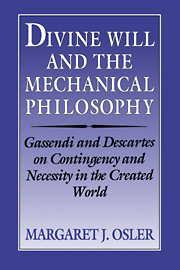 Divine Will and the Mechanical Philosophy
Divine Will and the Mechanical Philosophy Book contents
- Frontmatter
- Contents
- Acknowledgments
- Introduction
- Part I Theology and the philosophy of nature
- Part II The mechanical philosophy and the formation of scientific styles
- 7 Introduction: Theories of matter and their epistemological roots
- 8 Gassendi's atomism: An empirical theory of matter
- 9 Mathematizing nature: Descartes' geometrical theory of matter
- 10 Conclusion: Theology transformed – the emergence of styles of science
- Bibliography
- Index
10 - Conclusion: Theology transformed – the emergence of styles of science
Published online by Cambridge University Press: 11 September 2009
- Frontmatter
- Contents
- Acknowledgments
- Introduction
- Part I Theology and the philosophy of nature
- Part II The mechanical philosophy and the formation of scientific styles
- 7 Introduction: Theories of matter and their epistemological roots
- 8 Gassendi's atomism: An empirical theory of matter
- 9 Mathematizing nature: Descartes' geometrical theory of matter
- 10 Conclusion: Theology transformed – the emergence of styles of science
- Bibliography
- Index
Summary
I am of your opinion that Gassendes and De Cartes are of different dispositions.
Charles Cavendish to John Pell, December 1644In this study, I have examined the transformation of medieval ideas about God's relationship to the creation into seventeenth-century ideas about matter and method as embodied in early articulations of the mechanical philosophy. Medieval thinkers were primarily concerned with the theological problem of God's relationship to the world he created. They discussed questions about necessity and contingency as related to divine power. By the seventeenth century, the focus had shifted to natural philosophy and the extent and certitude of human knowledge. Underlying theological assumptions continued to be reflected in the epistemological and metaphysical orientations incorporated into different versions of the mechanical philosophy.
I have argued that the differences between Gassendi's and Descartes' versions of the mechanical philosophy directly reflected the differences in their theological presuppositions. Gassendi described a world utterly contingent on divine will. This contingency expressed itself in his conviction that empirical methods are the only way to acquire knowledge about the natural world and that the matter of which all physical things are composed possesses some properties that can be known only empirically. Descartes, on the contrary, described a world in which God had embedded necessary relations, some of which enable us to have a priori knowledge of substantial parts of the natural world. The capacity for a priori knowledge extends to the nature of matter, which, Descartes claimed to demonstrate, possesses only geometrical properties.
Information
- Type
- Chapter
- Information
- Divine Will and the Mechanical PhilosophyGassendi and Descartes on Contingency and Necessity in the Created World, pp. 222 - 236Publisher: Cambridge University PressPrint publication year: 1994